牛津9A Unit3知识点归纳难点解析语法复习
牛津9A Unit 3 重点词汇解析

牛津9A Unit 3 重点词汇解析■江苏李建高1. refuse【解析】refuse既可作不及物动词,也可作及物动词,意为“拒绝,不愿”。
refuse作及物动词时,其后可接名词、代词或动词不定式。
refuse to do sth. 表示“拒绝做某事,不愿做某事”。
如:He asked her to marry him but she refused. 他向她求婚,可是她拒绝了。
I really didn’t want to refuse his help, but I still did. 我并不想拒绝他的帮助,但我还是拒绝了。
I don’t think she’ll refuse me. 我想她不会拒绝我的。
He refuses to do any extra work. 他拒绝做任何额外的工作。
【练一练】根据提示,完成句子。
⑴我们邀请他来参加我们的聚会,但他拒绝了。
We invited him to come to our party, but he ______.⑵Daniel refused ______ his bike yesterday.A. to let me rideB. me to rideC. my ridingD. that I should ride2. receive & accept【辨析】receive和accept都有“收到”的意思。
但receive只表示客观上“收到(某物)”,是被动“收到、接到”,与主观愿望无关,而accept表示主观上“乐意接受(某物)”,强调主动或自愿“接受”,或者说是经过考虑后同意接收。
如:I received a letter from my parents yesterday. 昨天我收到父母的来信。
I cannot accept the fact that I didn’t pass the examination. 我无法接受考试不及格的事实。
牛津英语9AUnitUnit3单词短语重难点解析
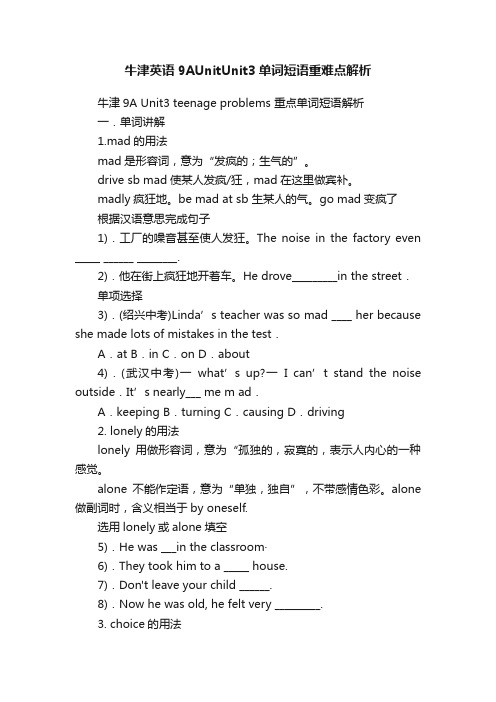
牛津英语9AUnitUnit3单词短语重难点解析牛津9A Unit3 teenage problems 重点单词短语解析一.单词讲解1.mad的用法mad是形容词,意为“发疯的;生气的”。
drive sb mad使某人发疯/狂,mad在这里做宾补。
madly疯狂地。
be mad at sb 生某人的气。
go mad变疯了根据汉语意思完成句子1).工厂的噪音甚至使人发狂。
The noise in the factory even _____ ______ ________.2).他在街上疯狂地开着车。
He drove_________in the street.单项选择3).(绍兴中考)Linda’s teacher was so mad ____ her because she made lots of mistakes in the test.A.at B.in C.on D.about4).(武汉中考)一what’s up?一I c an’t stand the noise outside.It’s nearly___ me m ad.A.keeping B.turning C.causing D.driving2. lonely的用法lonely用做形容词,意为“孤独的,寂寞的,表示人内心的一种感觉。
alone不能作定语,意为“单独,独自”,不带感情色彩。
alone 做副词时,含义相当于by oneself.选用lonely或alone填空5).He was ___in the classroom·6).They took him to a _____ house.7).Don't leave your child ______.8).Now he was old, he felt very _________.3. choice的用法choice是名词,意为“选择,挑选”,have no choice but to…意为“别无选择,只能……”。
牛津译林版英语9A Unit3 单元知识解析
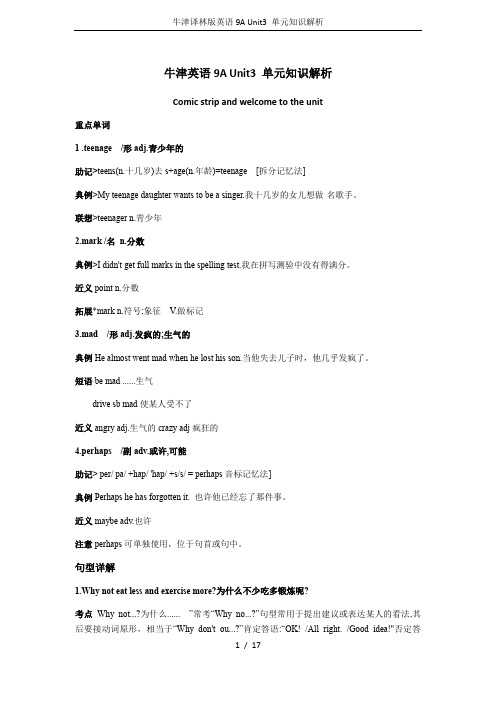
牛津英语9A Unit3 单元知识解析Comic strip and welcome to the unit重点单词1 .teenage /形adj.青少年的助记>teens(n.十几岁)去s+age(n.年龄)=teenage [拆分记忆法]典例>My teenage daughter wants to be a singer.我十几岁的女儿想做-名歌手。
联想>teenager n.青少年2.mark /名n.分数典例>I didn't get full marks in the spelling test.我在拼写测验中没有得满分。
近义point n.分数拓展*mark n.符号;象征V.做标记3.mad /形adj.发疯的;生气的典例He almost went mad when he lost his son.当他失去儿子时,他几乎发疯了。
短语be mad ......生气drive sb mad使某人受不了近义angry adj.生气的crazy adj疯狂的4.perhaps /副adv.或许,可能助记> per/ pa/ +hap/ 'hap/ +s/s/ = perhaps音标记忆法]典例Perhaps he has forgotten it. 也许他已经忘了那件事。
近义maybe adv.也许注意perhaps可单独使用,位于句首或句中。
句型详解1.Why not eat less and exercise more?为什么不少吃多锻炼呢?考点Why not...?为什么...... ”常考“Why no...?”句型常用于提出建议或表达某人的看法,其后要接动词原形,相当于“Why don't ou...?”肯定答语:“OK! /All right. /Good idea!"否定答语:“Sorry, .../I'm afraid not.”★Why not go for a picnic? = Why don't you go for a picnic?为什么不去野餐呢?★-Why not go swimming为什么今天下午不去游泳呢?-Good idea! /Sorry, I'm busy this afternoon. 好主意! /对不起,我今天下午很忙。
牛津英语9AUnitUnit3单词短语重难点解析

牛津9A Unit3 teenage problems 重点单词短语解析一.单词讲解1.mad的用法mad是形容词,意为“发疯的;生气的”。
drive sb mad使某人发疯/狂,mad在这里做宾补。
madly疯狂地。
be mad at sb 生某人的气。
go mad变疯了根据汉语意思完成句子1).工厂的噪音甚至使人发狂。
The noise in the factory even _____ ______ ________.2).他在街上疯狂地开着车。
He drove_________in the street.单项选择3).(绍兴中考)Linda’s teacher was so mad ____ her because she made lots of mistakes in the test.A.at B.in C.on D.about4).(武汉中考)一what’s up?一I can’t stand the noise outside.It’s nearly___ me mad.A.keeping B.turning C.causing D.driving2. lonely的用法lonely用做形容词,意为“孤独的,寂寞的,表示人内心的一种感觉。
alone不能作定语,意为“单独,独自”,不带感情色彩。
alone做副词时,含义相当于by oneself.选用lonely或alone填空5).He was ___in the classroom·6).They took him to a _____ house.7).Don't leave your child ______.8).Now he was old, he felt very _________.3. choice的用法choice是名词,意为“选择,挑选”,have no choice but to…意为“别无选择,只能……”。
上海版牛津英语9A第三单元知识点以及语法点

上海版牛津英语第三单元知识点以及语法点现在完成时1. 概念:①表示过去发生的或已经完成的某一动作对现在造成的影响或结果.eg: --- Have you had your lunch yet ? 你吃过午饭了吗?--- Yes, I have just had it. 是的, 我刚吃过. ( 说明现在饱了)I have lost my pen. 我把钢笔弄丢了. ( 过去某时丢的, 现在还没有找到)I have already watched the TV play. 我已经看过这部电视剧了.--- Have you found your lost pen yet ? 你找到丢失的钢笔了吗?--- No, I haven’t found it yet. 不, 我还没有找到.②表示动作或状态在过去已经开始, 持续到现在, 也许还要持续下去, 常和for,since, 连用, 表示持续的动作或状态多为延续性动词.eg: We have lived here since 2000. 自从2000年以来我们一直住在这里. ( 说明一直住在这里, 也许还会住下去. )2. 结构:①主语+ have / has + done + …Done的形式:规则:1. 一般情况下在动动词原形后加ed. 如: work, jump, look, …2. 以e 结尾的动词, 直接加-d. 如: live,3. 以辅音字母加y 结尾的动词, 先将y 变i 再加-ed. 如: carry, study, try…4. 以重读闭音节结尾且末尾只有一个辅音字母的, 双写此辅音字母后再加-ed. 如: stop, plan,…不规则:keep-----kept sweep-----swept sleep-----sleptSell----sold tell----toldLend---lent spend----spent send-----sentSay-----said pay-----paidBurn----burnt learn-----learnt mean----meantBreak----broken speak----spoken steal----stolenWear-----worn bear----born tear----tornGrow----grown blow---blown know----known throw----thrownSink-----sunk swim---swum drink----drunk ring-----rung sing----sung began----begunDrive---driven rise----risen3. 时间状语:常与already, yet, ever, never, for + 段时间, since, just, before, so far, by now,these days, …等连用.注意: already, yet, 常和现在完成时连用, already 用于肯定句, 可放在助动词之后、过去分词之前,也可放在句末.yet用在疑问句中意为”已经”, 用在否定句中表示”还”, 常放在句末.eg: He has just come here since 2000. 他从北京回来.Have you ever been to Shanghai ? 你去过上海吗?I have never traveled by plane before. 我以前从来没有乘飞机旅行过.I haven’t heard of it before. 我以前从来没有听说过这件事.I have been in Beijing for two years. 我在北京已经两年了.4. 句型: ⑴肯定句:①主语+ have / has + done + …eg:She has been to Shanghai. 她去过上海.I have finished doing my homework. 我已经完成我的作业了.⑵否定句: ①主语+ have / has + not +done + …eg:I haven’t seen this film. 我没有看过这部电影.eg:She hasn’t finished doing his homework. 她还没有完成她的作业.⑶一般疑问句:①Have / Has + 主语+ done + …eg: Have you seen this film ? Yes, I have. / No, I haven’t .你看过这部电影吗? 是的, 看过. / 不, 没有.eg:Has she finished doing his homework ? Yes, she has . / No, she has n’t.她完成她的作业了吗? 是的, 完成了. / 不, 没有.⑷特殊疑问句:①特殊疑问词+ have / has + 主语+ done + …eg: When has you seen this film ? 你什么时候看的这部电影?eg: Who has finished doing his homework ? 谁完成了作业?5. 当与一段时间连用时, 经常用for 加一段时间, 这时候谓语动词一定要用延续性的.非延续性动词----延续性动词come ---- be here go --- be away / off borrow --- keep buy --- have start / begin --- be on leave --- be away die --- be deadeg: He came here three days ago.他三天前来的这. (一般过去时)He has been here for three days.他来这已经三天了.(现在完成时与一段时间连用, 非延续性动词变延续性动词. )He went to Dalian last week. 他上周去的大连. ( 一般过去时)He has been away for a week.他已经离开有一周了. ( 现在完成时)I borrowed the book last month. 我去年借的这本书. (一般过去时)I have kept the book for a week. 我保管这本书有一周了.(现在完成时)6. 词义辨析have been to 去过… (在本地) eg: I have been to Canada. 我去过加加拿大.have gone to 去了… (不在本地) eg: He has gone to Dalian.他去了大连.1.--- Hello! Can I speak to Alice ? --- Sorry, she isn’t here right now. She ______ to the shop.A. goesB. will goC. has goneD. was going2. --- When did you become a volunter ? --- Two years ago. I _______ this group since then.A. have joined inB. have joined toC. have been inD. have been to3. ---______ you ______ to the National Grand Theater ? ---No, not yet.A. Did, goB. Do, goC. Have, goneD. Have, been4.---So far the government _______ a lot for the Olympic Games.--- So it has. We’re all looking forward to this event.A. doesB. is doingC. has doneD. will do5. John’s car is not here. I think he _______ somewhere.A. goesB. wentC. has goneD. will go6. David ________ Chinese since 20 years ago, and now he speaks it quite well.A. learnsB. learnedC. has learnedD. will learn7. ---Where’s Mr White ? ---He ________ the wash room.A. has been toB. has gone toC. is going toD. goes to8. ---What do you think of the new film ? ---It’s wonderful. I _______ it twice.--- A. saw B. have seen C. will see D. see9. ---_________ you ________ him around the museum yet ? ---Yes, we had a great time there.A. Do; showB.Did; showC. Have; shown课文知识点总结1.learn 短语learn from sb 向某人学习learn …….from…..从…..学习Learn….by heart 背诵,记住learn one’s lesson 吸取教训Learn of/about 得知2.run “举办,管理,经营”及物动词eg: Her father ran a shoes company in Beijing five years ago. 她爸爸五年前经营了一家鞋厂。
【教育资料】9A unit 3 知识点归纳学习精品

辅导教案提纲课题(课型)9A Unit 3 知识点总结教学内容牛津译林版9上Unit 3 Teenage problem 一、难点解析Words1.teenage(adj.)青少年的teenager(n.)青少年2.mark n. 分数marks(pl.) full marks满分high marks高分low marks 低分3.mad adj.发疯的;生气的drive sb. mad使某人受不了be mad at生……的气4.perhaps adv. 或许,可能,多用于句首,指有礼貌地提出请求或建议等。
5. deal vi. deal-dealt-dealt对付,处理how to deal with…=what to do with…怎样处理……6. imagine vt. vi. 想象;设想imagine sth. imagine doing sth.7. worth adj.值得;值…钱be (well) worth(doing) something8. suggestion n. 建议用作可数名词advice也意为“建议”,常用作不可数名词a piece of advice9.strict adj. 严格的,严厉的be strict with sb. 对某人严厉be strict in sth.对某事严格10. silence n.安静;寂静;沉默(不可数名词) in silence安静地keep silence保持沉默silent adj.安静的;沉默的11.worry n.担心的;令人担忧的事,表示具体的令人担忧的事为可数名词。
v. worry about adj. be worried about12.reply n.答复,回答复数为replies v. reply to ...13. progress n. 进展,进步不可数名词make (much) progress in...14.pronounce v.发音pronunciation n.15.be of sb’s age与……同龄at the age of... 在……岁时for ages 多年Welcome to the unit1. What’s wrong, Eddie?What’s wrong (with…)? =What’s the matter (with…)?e.g.-What’s wrong, Jim? -I left my umbrella on the bus.-What’s wrong with the bus? -It’s broken.2. I’m getting fat. (get为系动词+adj.)e.g. It’s getting hotter and hotter.3. You eat too much.too much 太多,修饰不可数名词too many 太多,修饰可数名词much too 太……,修饰形容词4. Why not eat less and exercise (v.) more?可数名词,意为“操;习题”do morning/eye exercises不可数名词,意为“锻炼” e.g. You can try your best and enjoy the exercise.5. The TV is always on at my home. be on(adv.)意为“开着的”e.g. Don’t leave the lights on.副词on 构成的短语还有turn on; move on; put on6. The noise almost drives me mad.noise n. noisy adj. noisily adv.固定结构drive/make sb. Mad (drive-drove-driven)Reading1.I do not know how I should deal with it. 我不知道我该如何处理它。
牛津英语9aUnit3语法

驰骏培训个性化教案编号:教案正文:牛津英语9A Unit 3语法一、复习五种句子结构(a)主语+谓语(S+V)→ Millie smiles.(b)主语+谓语+宾语(S+V+DO)→ I eat a banana.(c)主语+系动词+表语(S+V+P)→ She looks happy.(d)主语+谓语+宾语+宾语补足语(S+V+DO+OC)→ I find her smart.(e)主语+谓语+间接宾语+直接宾语(S+V+IO+DO)二、不定式的用法不定式的完整形式为"to +动词原形",但在一些特殊情况下应使用不带to的不定式,不定式的主要用法如下:1、充当主语不定式可置于句首作主语,但我们常用it作形式主语,而将真正的主语(不定式后置)。
To invite her to the party is impossible.=It is impossible to invite her to the party2、充当表语不定式可置于be等系动词后作表语。
My dream is to be a director.3、充当宾语不定式可充当及物动词的宾语,如afford,agree,decide,fail,forget,hope,,learn,plan,prefer,promise,refuse,remember,try等My brother forget to tell me the truth.4、充当宾语补足语不定式可置于一些动宾结构之后充当宾语补足语,常见的此类结构有:advise/allow/remind/want sb to do sth 等5、充当定语不定式作定语时须后置,与被修饰的名词有逻辑上的动宾关系Are there many places to visit in London?6、充当状语不定式可跟在动词之后充当目的状语或结果状语I come here only to say goodbye to you.三、不带to的不定式1、不定式作使役动词及感官动词的宾语补足语时不带to。
牛津初中英语9A-Unit3知识点归纳

牛津初中英语9A Unit3知识点归纳重点短语Welcome to the uniteat too much/worry too much吃得太多/担心太多get enough sleep 得到足够的睡眠be on (灯、电视等)开着、亮着too many tests 太多的测试close friends 亲密的朋友drive sb mad = make sb mad 把某人逼(go mad发疯)have no communication with sb 与某人没有交流Readinghow … deal with…=what… do with…怎样处理…….. have no choice but to do sth 除了做某事别无选择stay up late 熬夜complete/finish the exercises 完成这些练习(指笔头l 练习)refuse to do sth 拒绝做某事hand it/them in= turn in 上交(代词放中间)hand out 分发(代词放中间)feel bad about…对….感到糟糕be (well) worth doing sth (很)值得做某事on time 按时;准时in time 及时have some spare/free time 有空余时间offer sb. sth. = offer sth. to sb. 为某人提供某物provide sb with sth = provide sth for sb为某人提供某物offer sb some suggestions/ adviceoffer to do sth 主动提出做某事be of great value(n.)to sb = be very valuable to sb 对某人来说有很大价值hear from sb.(短) = get/receive a letter from sb.(短)=have a letter from sb.(延)收到某人来信be crazy about…对…..很着迷my love of football 我对足球的热爱plenty of = lots of/a lot of 大量的,充足的(后接可数/不可数名词)stay out late 呆在外面很迟get into trouble 陷入困境allow doing / allow sb to do sth 允许做某事/允许某人做某事be stric t with sb. 对某人要求严格be strict in sth. 对某事要求严格wish (sb) to do sth 希望(某人)做某事advise sb to do sth 建议某人做某事advise doing sth建议做某事achieve/keep a balance between…获得/保持…之间的平衡succeed in doing sth= be successful in doing sth成功地做某事make a list of…列一个…..清单work …..out解出,制定出…..(代词放中间)take /follow one's advice 接受/采纳某人的建议a piece of advice 一条建议(建议不可数)agree with sb 同意某人(的意见)give sth. up放弃某事(代词放中间)give up doing sth.放弃做某事forget about sth.忘记有关…的事an hour or two 一两个小时Vocabulary and Grammarget/receive low/high marks得到低/高分at the moment = at present = now目前Revise(= go over) for tests 复习迎考there is no need to do sth 没有必要做某事have no courage to do sth 没有勇气做某事to tell you the truth(n.)实话告诉你quarrel with sb about sth 与某人争吵某事spare some time for sb = spare sb some time 为某人匀出时间turn down/up 调低/高音量make progress 取得进步solve the problems 解决问题youth workers 青少年辅导员valuable suggestions 有价值的建议Integrated Skills and Study skillslaugh at sb 嘲笑某人pay no attention to sb 不注意某人be proud of …= take pride in…为…….感到骄傲reply to (my e-mails) = answer (my e-mails)回复,回答(我的电子邮件)suffer from….遭受…..痛苦;患病ask sb for advice 向某人征询意见make enough time for…为……腾出足够的时间Main task and Checkoutblame sb for sth 因某事而责备某人cause of stress 产生压力的原因of one’s age 与某人同年龄的one main cause of stress压力的一个主要原因keep your worries to yourself 把担忧留给自己====Word 行业资料分享--可编辑版本--双击可删====源-于-网-络-收-集重点句子后无to,无do 有to) (或do 的某种形式)I didn't nothing but wait9. We like staying out late to play football. 我们喜欢待在外面踢足球到很晚10. They can help us relax and make our lives more interesting 这能帮助我们放松并使我们的生活更加有趣11. I wish I could have my parents' support 我希望我得到父母的支持 (wish 引导的宾语从句用虚拟语气)13.It seems that you spend a lot of time playing football.= You seem to spend a lot of time playing football.17. I really don’t know which to do first. 我真不知道先做哪一个.你能告诉我和谁去谈、去哪里求助吗?谢谢你聆听我的问题并给我提出建议.。
上海版牛津英语9A第三单元知识点以及语法点
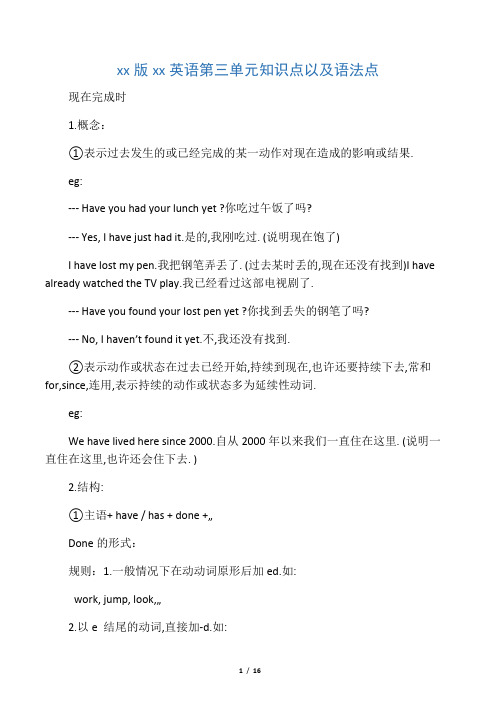
xx版xx英语第三单元知识点以及语法点现在完成时1.概念:①表示过去发生的或已经完成的某一动作对现在造成的影响或结果.eg:--- Have you had your lunch yet ?你吃过午饭了吗?--- Yes, I have just had it.是的,我刚吃过. (说明现在饱了)I have lost my pen.我把钢笔弄丢了. (过去某时丢的,现在还没有找到)I have already watched the TV play.我已经看过这部电视剧了.--- Have you found your lost pen yet ?你找到丢失的钢笔了吗?--- No, I haven’t found it yet.不,我还没有找到.②表示动作或状态在过去已经开始,持续到现在,也许还要持续下去,常和for,since,连用,表示持续的动作或状态多为延续性动词.eg:We have lived here since 2000.自从2000年以来我们一直住在这里. (说明一直住在这里,也许还会住下去. )2.结构:①主语+ have / has + done +…Done的形式:规则:1.一般情况下在动动词原形后加ed.如:work, jump, look,…2.以e 结尾的动词,直接加-d.如:live,3.以辅音字母加y 结尾的动词,先将y 变i 再加-ed.如:carry, study, try…4.以重读闭音节结尾且末尾只有一个辅音字母的,双写此辅音字母后再加-ed.如:stop,plan,…不规则:keep-----kept sweep-----swept sleep-----sleptSell----sold tell----toldLend---lent spend----spent send-----sentSay-----said pay-----paidBurn----burnt learn-----learnt mean----meantBreak----broken speak----spoken steal----stolenWear-----worn bear----born tear----tornGrow----grown blow---blown know----known throw----thrownSink-----sunk swim---swum drink----drunk ring-----rung sing----sung began----begunDrive---driven rise----risen3.时间状语:常与already,yet,ever,never,for +段时间,since,just,before,so far,by now,these days,…等连用.注意:already, yet,常和现在完成时连用, already用于肯定句,可放在助动词之后、过去分词之前,也可放在句末.yet用在疑问句中意为”已经”,用在否定句中表示”还”,常放在句末.eg:Have you ever been to Shanghai ?你去过上海吗?I have never traveled by plane before.我以前从来没有乘飞机旅行过.I haven’t heard of it before.我以前从来没有听说过这件事.I have been in Beijing for two years.我在北京已经两年了.4.句型:⑴肯定句:①主语+ have / has + done+…eg:She has been to Shanghai.她去过上海.I have finished doing my homework.我已经完成我的作业了.⑵否定句:①主语+ have / has + not +done +…eg:I haven’t seen this film.我没有看过这部电影.eg:She hasn’t finished doing his homework.她还没有完成她的作业.⑶一般疑问句:①Have / Has +主语+ done +…eg:Have you seen this film ?Yes, I have. /No, I haven’t .你看过这部电影吗?是的,看过. /不,没有.eg:Has she finished doing his homework ?Yes, she has . /No, she hasn’t.她完成她的作业了吗?是的,完成了. /不,没有.⑷特殊疑问句:①特殊疑问词+ have / has +主语+ done+…eg:When has you seen this film ?你什么时候看的这部电影?eg:Who has finished doing his homework ?谁完成了作业?5.当与一段时间连用时,经常用for 加一段时间,这时候谓语动词一定要用延续性的.非延续性动词----延续性动词eg:He came here three days ago.他三天前来的这. (一般过去时)He has been here for three days.他来这已经三天了.(现在完成时与一段时间连用,非延续性动词变延续性动词. )He went to Dalian last week.他上周去的大连. (一般过去时)He has been away for a week.他已经离开有一周了. (现在完成时)I borrowed the book last month.我去年借的这本书. (一般过去时)I have kept the book for a week.我保管这本书有一周了.(现在完成时)6.词义辨析have been to 去过…(在本地)eg:I have been to Canada.我去过加加拿大.have gone to 去了…(不在本地)eg:He has gone to Dalian.他去了大连.--- Hello! Can I speak to Alice ?---Sorry, she isn’t here right now. She ___ to the shop.A. goes B. will go C. has gone D. was going3. ---___ you ___ to the National Grand Theater ?---No, not yet.A. Did, goB. Do, goC. Have, goneD. Have, been4.---So far the government ____ a lot for the Olympic Games.---So it has. We’re all looking forward to this event.A. doesB. is doingC. has doneD. will do5. John’s car is not here. I think he ____ somewhere.A. goesB. wentC. has goneD. will go6. David ____ Chinese since 20 years ago, and now he speaks it quite well.A. learnsB. learnedC. has learnedD. will learn7. ---Where’s Mr White ?---He ____ the wash room.A. has been toB. has gone toC. is going toD. goes to8. ---What do you think of the new film ?---It’s wonderful. I ____it twice.--- A. sawB. have seen C. will see D. see9.---_____you ____him around the museum yet ?---Yes,we had a great time there.A. Do; showB.Did; showC. Have; shown课文知识点总结learn 短语learn from sb 向某人学习learn …….from…..从…..学习Learn….by heart背诵,记住learn one’s lesson 吸取教训Learn of/about 得知run “举办,管理,经营”及物动词eg:be famous for 以…而著名famous“著名的,文明的”= well-knowntime “次数,倍数”可数名词Eg:She has been to Beijing three times.Don’t worry. There is enough time.不用着急,有足够的时间。
英语:Unit 3知识梳理(译林牛津九年级上)
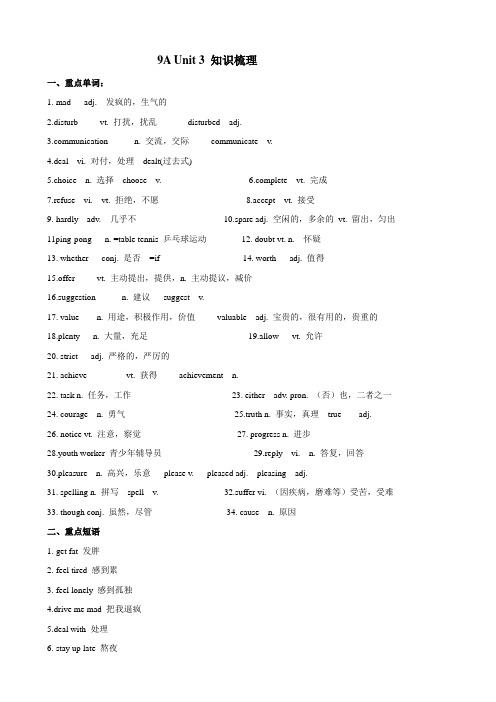
9A Unit 3 知识梳理一、重点单词:1. mad adj. 发疯的,生气的2.disturb vt. 打扰,扰乱disturbed adj.munication n. 交流,交际communicate v.4.deal vi. 对付,处理dealt(过去式)5.choice n. 选择choose v.plete vt. 完成7.refuse vi. vt. 拒绝,不愿8.accept vt. 接受9. hardly adv. 几乎不10.spare adj. 空闲的,多余的vt. 留出,匀出11ping-pong n. =table tennis 乒乓球运动12. doubt vt. n. 怀疑13. whether conj. 是否=if 14. worth adj. 值得15.offer vt. 主动提出,提供,n. 主动提议,减价16.suggestion n. 建议suggest v.17. value n. 用途,积极作用,价值valuable adj. 宝贵的,很有用的,贵重的18.plenty n. 大量,充足19.allow vt. 允许20. strict adj. 严格的,严厉的21. achieve vt. 获得achievement n.22. task n. 任务,工作23. either adv. pron. (否)也,二者之一24. courage n. 勇气25.truth n. 事实,真理true adj. 26. notice vt. 注意,察觉27. progress n. 进步28.youth worker 青少年辅导员29.reply vi. n. 答复,回答30.pleasure n. 高兴,乐意please v. pleased adj. pleasing adj.31. spelling n. 拼写spell v. 32.suffer vi. (因疾病,磨难等)受苦,受难33. though conj. 虽然,尽管34. cause n. 原因二、重点短语1. get fat 发胖2. feel tired 感到累3. feel lonely 感到孤独4.drive me mad 把我逼疯5.deal with 处理6. stay up late 熬夜7. hand in上交8.on time 及时9.hear from 收到…的来信10.be of great value有极大的价值11.be crazy about 对…着迷12.plenty of 大量的,许多13.stay out late 在外迟14.from time to time 有时,不时的15.allow sb to do sth 允许16.achieve a balance between …and 在…和…之间达到平衡17.get/take a bus上公车18.get/become angry 生气19.get/achieve a high mark 得高分20.get /have a lot of homework有许多作业21.get/arrive home late 到家迟22.get/receive a letter收到一封信23.a lot of traffic交通拥挤24.revise for tests为了测试复习25.tell ab the truth实话相告26.quarrel with与…争吵27.spare some time for sb匀一些时间给…28.care only about marks只关心成绩29.the top student尖子生30.share your problems with sb和…分担你的烦恼31.pay no attention to不在意…ugh at嘲笑33.be proud of为…自豪34.reply to 给…回复35.suffer from stress 承受着压力36.make a list of 列出…的目录37.shout at对…大叫38.keep quiet 保持安静39.feel bad about sth对…感到伤心40.keep your worries to yourself把忧伤留给自己41.make me laugh 让我笑42.all day 整天43.have close friends有亲密的朋友44.be on开着、进行着45.give sb advice on sth在某方面给某人建议46.feel bad about感觉……不好47.offer sb sth/offer sth. to sb向某人提供某物48.offer to do sth.主动愿意做某事49.be strict with sb对某人严格50.feel stressed 感到有压力的51.have sb’s support 得到某人的支持52.wish sb to do sth希望某人做某事53.succeed in doing sth 成功地做某事54.stop doing sth停止做某事55.stop to do sth停下来做另一件事56.an hour or two一、两个小时57.mark the tests 阅卷58.write to sb给某人写信59.for a while一会儿60.be good at擅长、善于61.be weak in在……方面差62.try one’s best (to do sth)尽某人最大的努力(做某事)63.thank sb for doing sth感谢某人做某事64.ask sb for advice 向某人征询意见65.ask sb for help.先某人求助66.Why do n’t you do sth?你为什么不做某事呢?67.Why not do sth? 为什么不做某事呢?68.cause of stress 产生压力的原因三、重点句子及句型:1.It’s unhealthy for you to eat too much. 对于你吃太多是不健康的。
9A-Unit-3单元重点语言点讲解

最新牛津译林版9A Unit 3 Teenage problems语言点知识点讲解一、课本中重点词、短语、句型讲解▲Comic strips & Welcome to the unit1. What’s wrong, Eddie 怎么了,埃迪形容词wrong意思是“出错的”,此句相当于What’s the matter with you, Eddie 或What happened to you, EddieWhat’s wrong with sb. / What’s the matter with sb./ What happened to sb.常用来询问别人发生了什么事。
例如:---What’s wrong with you You look very tired.---Thank you. I’m OK.2. Why not eat less and exercise more 为什么不少吃一点,多多锻炼呢这一咱表示建议的句子。
日常会话中还会用到:Why don’t you do--- “你为什么不做---呢”表示对别人进行一种语气强烈的建议。
例如:---Today is a fine day. Why don’t you go boating together----I think it’s a good idea.用于“建议别人做某事”的句型还有:Would you like to do--- Shall we do --- Let’s do ---. Would you please do---等。
3. Maybe you’re right. 也许你是对的。
此处“maybe”表示“也许;大概”的意思。
相当于“perhaps”,放在句首,表示后面句子所叙述的情况也许会发生,或也许是事实。
“may be”表示“也许是”,是“情态动词+动词原形be”形式,通常放在句中。
例如:She may be our new English teacher. 她也许是我们的新任英语老师。
牛津译林版英语9A-Unit-3-知识点总结解析
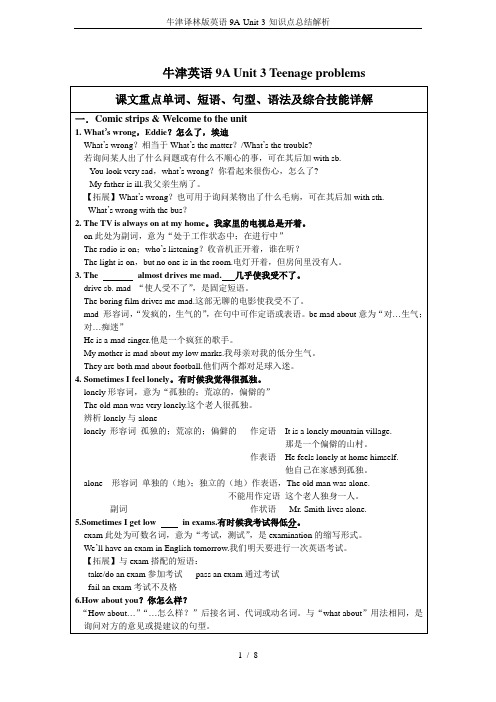
--You look very sad,what’s wrong?你看起来很伤心,怎么了?
--My father is ill.我父亲生病了。
【拓展】What’s wrong?也可用于询问某物出了什么毛病,可在其后加with sth.
We all went to the cinema except Tom. He was ill.除了汤姆,我们都去看电影了。他生病了。
Amy has another two good friends besides you.除了你之外,诶米还有两个好朋友。
3.I often have to stay up late。我经常不得不熬夜到很晚。
hardly副词,意为“几乎不”,相当于almost not,用于连系动词、助动词或情态动词之后,实义动词之前。
I hardly ate anything last night.我昨天晚上几乎什么也没吃。
This year’s exam was much harder than last year’s.今年的测试比去年的难得多。
What did you do with your old bike?你怎么处理得你的旧自行车?
2….I have no choice but to do it。…我别无选择,只能去做。
have no choice but to do sth.意为“别无选择,只能去做某事”
She has no choice but to study hard.她别无选择,只能努力学习。
except除…之外(不再有)指从整体排除except后的人或物,常与all,everybody,everything等连用
新版牛津译林 9AUnit3知识点和考点

9A Unit 3 Teenage ProblemsⅠ考点一览1.考察go over的动词短语,主要跟其他over相关的短语做区分,如come over,turn over和fall over2.考察worth的固定搭配be worth doing,可能会考察worth的含义,更可能考察的是worth后面的动词形式,一定要记住是ing形式。
3.考察hardly的用法,主要考察它的否定意义。
4.考察提建议的句型。
why not和what/how about是疑问句的句型,而其他是陈述句句型。
因此要注意句子后面的标点符号是。
还是?。
5.考察progress的用法,一种是考察固定搭配make progress,另外一种是考察progress可不可数。
6.考察of one's age的用法,主要是区分其与at the age的区别。
7.考察动词+it+宾补+to do sth的用法。
两种常见考法,第一,考察做形式宾语的是it,不是that、this和those,代词考点,第二,考察to do sth,不是doing sth,非谓语动词考点。
8.考察work out的意思,考察work out与hand out、find out和put out介词相同的词组意思区别。
9.考察why not后面加动词原形,表示建议的句型中,后面有加动词原形的、有加动词ing的,还有加动词to do不定式的,要分清楚。
10.考察be worth后面加动词ing形式,表示值得做某事。
11.考察have no choice but后面加to do不定式,表示不得不做某事。
12.考察develop的名词形式development。
13.考察单词strict, correctly, deal, imagine和pronunciation的拼写,知道如何拼写即可,唯一要注意的是correctly的形式,是副词的形式。
Ⅱ考点考题单项选择1.go over意思是复习,句中常常是go over the notes again before the test【2017年新城】26.—To get a better grade, you should_____ the notes again before the test.---Thanks. I will.e overB.go overC.turn overD.fall over答案B【2017-2018 金陵河西】27. In order to get high marks in exams, you had better ____ what youhave learned and do homework carefully.A. go onB. go downC. go byD. go over答案D2.worth做形容词,意思是值得的。
牛津9A Unit3知识点归纳、难点解析、语法复习

9A Unit 3 Teenage problems【短语归纳】1.get fat 变胖2.eat too much 吃太多/ worry too much 过于担心3.try more exercise 多加锻炼4.from time to time 时而不时/ sometimes/at times5.get enough sleep 得到足够的睡眠 sleep well 睡得好6.feel tired in class 在课堂上感到累7.be on 开着、进行着8.drive me mad 使我发疯≈ make me mad9.have close friends 有亲密的朋友/ have no close friends 没有亲密的朋友10.feel lonely 感到孤独11.make a lot of noise 发出许多噪音12.all day 整天13.get too many tests and exams 有太多的考试考试 (越来越正式) quiz ---- test ----- exam14.have enough sleep 有足够的睡眠15.be too noisy at home 家里太吵16.have a problem(with …) = have got a problem(with …)有( …… .)问题17.no communication with family members 不和家人交流18.a Grade 9 student 一个 9 级级学生how … .deal with… .. 怎样处理19. what … . do with… .. 怎样处理20. have no choice but to do sth 除了做某事别无其他选择21. stay up late 熬夜 stay out late 呆在外面很晚22. refuse to do sth 拒绝做某事23. hand in 上交; hand out 分发 ( 代词放中间 hand it in)24. on time 按时、准时; in time 及时25. have spare time 有业余时间26. offer sb sth/offer sth to sb 向某人提供某物27. 收到某人的来信 hear from sb. (瞬间动词)= get / receive a letter from sb. (瞬间动词)= have a letter from sb. (延续性动词)28. be crazy about 对……很着迷29. plenty of 大量,充足≈a lot of30. get into trouble 陷入麻烦/陷入困境31. allow sb to do sth 允许某人做某事 allow doing sth 允许做某事32. love of football 对足球的喜爱33. be strict with sb 对某人严格 be strict with sb. in sth. 在某事上对某人要求严格34. feel stressed 感到有压力的35. sb+spend +时间或金钱…on +sth 某人在某事上花费(时间或金钱)36. spend less time on … . 在…上花较少的时间37. achieve a balance between…and … 在… ..和… .之间获得平衡38. succeed in doing sth 成功地做某事= be successful in doing sth.= do sth. successfully39. feel bad about 感觉……不好40. make a list of 列一个… … 的清单41. work …out 解出… ..(代词放中间)42. get/receive low/high marks 得到低/高分43. at the moment = at present = now 目前44. wish sb to do sth 希望某人做某事45. wish to do sth = hope to do sth. 希望做某事46. work out 算出、解出47. forget about sth 忘记有关…… 的事48. take a bus 乘公交车49. get angry 生气、发怒50. feel stressed s 感到有压力51. advise sb. to do sth. 建议某人做某事52. be good for sb. 对某人有益53. be useful to sb 对某人有用54. give sb. advice 给某人提建议55. a piece of advice = a suggestion 一则建议 two pieces of advice = two suggestions 两则建议56. an hour or two = one or two hours 两个小时57. join in some activities 参加一些活动58. revise for tests 复习迎考59. share sth. with sb. 和某人分享某物60. have a lot of homework to do 有很多家庭作业做61. tell sb about sth 告诉某人有关…… 的事62. need to do sth 需要做某事63. have a test 考试64. solve the problems 解决问题65. turn down the TV/ 把电视声音开小些 turn up 开大些 turn on 开 turn off 关66. write to sb 给某人写信67. youth workers 青少年辅导员68. help sb. out 帮助某人脱离困境69. the top student 尖子生70. suffer from sth 遭受……之苦71. pay no attention to …不注意/在意… ..72. take turns to do … 轮流做… .73. reply to (my e-mails) 回复(我的电子邮件)74. my last three e-mails 我最近的三封邮件75. not… . any more = no more 不再not…… any longer = no longer76. Thank sb for doing sth 感谢某人做某事77. laugh at sb/sth 嘲笑某人/某物78. ask sb for advice 向某人征询意见 ask sb for help 向某人求助79. shout at sb 对某人大喊80. choose to do sth 选择做某事81. blame your parents 责备你的父母82. be worried about sth/sb 为某事/某人而担忧83. keep quiet 保持安静84. keep one’s worries to onesel f 把烦恼闷在心里85. take a holiday 休假86. the cause of stress 产生压力的原因87. solve the problem 解决问题88. feel bad about your weight 对体重感到糟糕89. keep fit = keep healthy 保持健康90. Why not go walking ? 为什么不去散步呢? Why not go for a walk? Why not take / have a walk? 100. have a delicious meal 美餐一顿101. be proud of …= take pride in… 为…… .感到骄傲102. plan your day carefully 精心计划你的每一天【句型归纳及难点解析】1. 青少年问题 teenage problems 青少年的( 13— 19 岁的)青少年 teen = teenager (13— 19 岁的青少年)2. 有 have got (英式) = have (美式)3. 变胖/变得越来越胖 get fat / get fatter and fatter这些天我越来越胖 I am getting fatter and fatter these days4. 擅长于… . be good at … = do well in …在… .方面弱 be weak in …对…… .有好处be good for …对……有用be useful to …我擅长英语但我体育较差。
牛津9AU3知识点

9AUnit3 Teenage problems一、难点解析Words1.teenage(adj.青)少年的 teenager(n.)青少年2.mark n. 分数 marks(pl.) full marks 满分 high marks 高分 low marks 低分3.mad adj.发疯的;生气的drive sb. mad 使某人受不了be mad at生的气4.perhaps adv. 或许,可能,多用于句首,指有礼貌地提出请求或建议等。
5.deal vi. deal-dealt-dealt对付,处理 how to deal with, =what to do with, 怎样处理 ,,6.imagine vt. vi. 想象;设想 imagine sth. imagine doing sth.7.worth adj.值得;值钱 be (well) worth(doing) something8. suggestion n.建议用作可数名词many suggestionsadvice 也意为“建议”,常用作不可数名词 a piece of advice9. strict adj.严格的,严厉的be strict with sb. 对某人严厉be strict in sth.对某事严格10. silence n.安静;寂静;沉默不可数名词in silence 安静地 keep silence保持沉默silent adj.安静的;沉默的11.worry n.担心的;令人担忧的事,表示具体的令人担忧的事为可数名词。
v. worry about adj. be worried about12.reply n.答复,回答复数为replies v. reply to13.progress n. 进展,进步不可数名词 make (much) progress14.pronounce v发.音 pronunciation n.15.be of sb’s age与 ,, 同龄at the age of在 ,, 岁时for ages 多年Welcome to the unit1. What ’s wrong, Eddie?What’s wrong (with )? =What’s the matter (with )?e.g.-What’s wrong, Jim? -I left my umbrella on the bus.-What’s wrong with the bus? -It ’s broken.2.I ’m getting fat. (get 为系动词 +adj.)e.g. It’s getting hotter and hotter.3.You eat too much.too much太多,修饰不可数名词too many 太多,修饰可数名词much too 太 ,, ,修饰形容词4. Why not eat less and exercise (v.) more?可数名词,意为“操;习题”do morning/eye exercises不可数名词,意为“锻炼” e.g. You can try your best and enjoy the exercise.5. The TV is always on at my home. be on(adv.)意为“开着的”e.g. Don’tleave the lights on.副词 on 构成的短语还有 turn on; move on; put on 6.The noise almost drives me mad.noise n. noisy adj. noisier noisily adv. more noisily 固定结构drive/make sb. mad (drive-drove-driven)Reading1.I do not know how I should deal with it.我不知道我该如何处理它。
- 1、下载文档前请自行甄别文档内容的完整性,平台不提供额外的编辑、内容补充、找答案等附加服务。
- 2、"仅部分预览"的文档,不可在线预览部分如存在完整性等问题,可反馈申请退款(可完整预览的文档不适用该条件!)。
- 3、如文档侵犯您的权益,请联系客服反馈,我们会尽快为您处理(人工客服工作时间:9:00-18:30)。
牛津9A-Unit3知识点归纳、难点解析、语法复习.Teenage problems 9A Unit 3【短语归纳】变胖 1.get fat 过于担心吃太多/ worry too much2.eat too much3.try more exercise 多加锻炼/ sometimes/at times4.from time to time 时而不时睡得 sleep well5.get enough sleep得到足够的睡眠好 6.feel tired in class在课堂上感到累开着、进行着7.be onmake me mad 8.drive me mad使我发疯≈close no 有亲密的朋友/ have 9.have close friends 没有亲密的朋友friends 感到孤独10.feel lonely 发出许多噪音11.make a lot of noise 整天12.all day exams tests and 有太多的考试13.get too manyquiz ---- test ----- exam (越来越正式)考试14.have enough sleep 有足够的睡眠15.be too noisy at home家里太吵a got ) = have 16.have aproblem(with… .)……问题problem(with…)有(不和家family members 17.no communication with 人交流级级学生18.a Grade 9student一个9 how ….deal with….. 怎样处理2怎样处理what …. do with….. 19. 除了做某事别无其20. have no choice but to do sth他选择呆在外面很晚 stay out late 21. stay up late 熬夜拒绝做某事22. refuse to do sth代词放中间 ( ; 上交hand out分发 23. hand inhand it in)及时按时、准时; in time24. on time 有业余时间25. have spare time向某人提供某物26. offer sbsth/offer sth to s收到某人的来信hear from sb. (瞬间动词)27.= get /receive a letterfrom sb. (瞬间动词)= have aletter from sb.(延续性动词)28. be crazy about对……很着迷29. plenty of 大量,充足≈a lot of30. get into trouble 陷入麻烦/陷入困境31. allow sb to do sth 允许某人做某事 allow doingsth允许做某事32. love of football对足球的喜爱33. be strict with sb对某人严格be strict with sb. in sth.在某事上对某人要求严格34. feel stressed感到有压力的35. sb+spend +时间或金钱…on +sth某人在某事上花费(时间或金钱)36. spend less time on …. 在…上花较少的时间337. achieve a balance between…and …在…..和….之间获得平衡38. succeed in doing sth成功地做某事= be successfulin doing sth.= do sth. successfully39. feel bad about感觉……不好40. make a list of列一个……的清单41. work …out解出…..(代词放中间)42. get/receive low/high marks得到低/高分43. at the moment = at present = now目前44. wish sb to do sth希望某人做某事45. wish to do sth = hope to do sth.希望做某事46. work out算出、解出47. forget about sth忘记有关……的事48. take a bus乘公交车49. get angry生气、发怒50. feel stressed s感到有压力51. advise sb. to do sth.建议某人做某事52. be good for sb. 对某人有益53. be useful to sb对某人有用54. give sb. advice 给某人提建议55. a piece of advice = a suggestion一则建议 twopieces of advice = two suggestions 两则建议56. an hour or two = one or two hours两个小时57. join in some activities 参加一些活动58. revise for tests复习迎考59. share sth. with sb. 和某人分享某物60. have a lot of homework to do 有很多家庭作业做461. tell sb about sth告诉某人有关……的事62. need to do sth需要做某事63. have a test 考试64. solve the problems 解决问题65. turn down the TV/把电视声音开小些 turn up开大些 turn on 开turn off 关66. write to sb给某人写信67. youth workers青少年辅导员68. help sb. out 帮助某人脱离困境69. the top student尖子生70. suffer from sth遭受……之苦71. pay no attention to…不注意/在意…..72. take turns to do …轮流做….73. reply to (my e-mails) 回复(我的电子邮件)74. my last three e-mails 我最近的三封邮件75. not…. any more = no more 不再 not……any longer = no longer 76. Thank sb for doing sth感谢某人做某事77. laugh at sb/sth 嘲笑某人/某物78. ask sb for advice向某人征询意见ask sb for help向某人求助79. shout at sb对某人大喊80. choose to do sth选择做某事81. blame your parents责备你的父母82. be worried about sth/sb为某事/某人而担忧83. keep quiet保持安静84. keep one's worries to oneself把烦恼闷在心里585. take a holiday 休假86. the cause of stress产生压力的原因87. solve the problem解决问题88. feel bad about your weight对体重感到糟糕89. keep fit = keep healthy保持健康90. Why not go walking ? 为什么不去散步呢?Why not go for a walk? Why not take / have a walk?100. have a delicious meal美餐一顿101. be proud of …= take pride in…为…….感到骄傲102. plan your day carefully 精心计划你的每一天【句型归纳及难点解析】1. 青少年问题 teenage problems 青少年的(13—19 岁的)青少年 teen = teenager (13—19 岁的青少年)2.有 have got (英式) = have (美式) and fatter / get get fat /3.变胖变得越来越胖fatterI am getting fatter and 这些天我越来越胖fatter these days… be good at… = do well in4. 擅长于….be weak in…. 在…方面弱…be good for…….有好处对 be useful to …有用对……我知道体育运动对我我擅长英语但我体育较差。
所以我认为把学会体育运动对们的身体有好处。
我们非常有用。
6I do very well in English but I am weak in sport.I know sport is very good for our bodies.So I think learning sport well is useful to us .5. I don't have any close friends to talk to. 我没有一个可以谈心的亲密朋友“to do sth ”作后置修饰语6. I have no choice but to do my homework. 除了做作业我别无选择。
have no choice but to ……别无选择,只能……7. for example和such as 都具有“例如”的意思。
suchas指要将举例的事物一一罗列出来,比如:Threestudents are my friend, such as: Li Ming,lily andMary. 但 for example是选举几个典型实例来说明,并不一一罗列(通常都是举一个例子)。
比如:For example, London is the capital of Britain.8.I often doubt whether it is worth working sohard我经常怀疑是否值得这么用功地学习引导的宾语从句,后不跟that 一般来说I doubt 引导的宾语从句'I dont doubt 后接thatThis talk is 值得…… be worth sth / doing sthworth listening to. 这个报告值得一听。
颐和园值得The Summer Palace is worth a visit一游。
9. I am looking forward to a holiday without7我一直都在盼望一个没有作业的假期homework 的特例用法体会 be +v-ing 盼望……look forward to sth / doing sth 期待/我一 I am looking forward to hearing from you直都期待着收到你的来信10.This will give you an idea of how much free timeyou have.这将会使你对你有多少空闲时间有所了解give sb. an idea of... .有所了解使某人对…你能给我11. Can you offer me some suggestions??提一些建议吗 = Can you offer some suggestions to me?我希望你认为我的建议值得采纳I hope you think that my advice is worth taking.采取/采纳/接受Can you please advise me how to achieve abalance between my schoolwork and my hobbies?你能给我提一些如何在我的学习与爱好之间取得平衡offer = give suggestion 是可数名词advice 是不可数名词▲offer 用作动词,意为“提供;”“为…提供机会,给予”常用短语“offer sb. sth或offer sth. to sb.”意思是“为某人提供某物”。
